Vauxhall Combo Cargo vs VW ID. Buzz Bus – Which one offers the better deal?
Compare performance, boot capacity, efficiency and price at a glance.
Find out which car is the better choice for you – Vauxhall Combo Cargo or VW ID. Buzz Bus?
Costs and Efficiency:
Price and efficiency are often the first things buyers look at. Here it becomes clear which model has the long-term edge – whether at the pump, the plug, or in purchase price.
Vauxhall Combo Cargo has a clearly advantage in terms of price – it starts at 22400 £, while the VW ID. Buzz Bus costs 42900 £. That’s a price difference of around 20415 £.
In terms of energy consumption, the advantage goes to the Vauxhall Combo Cargo: with 17.40 kWh per 100 km, it’s barely noticeable more efficient than the VW ID. Buzz Bus with 19 kWh. That’s a difference of about 1.60 kWh.
As for range, the VW ID. Buzz Bus performs clearly perceptible better – achieving up to 485 km, about 131 km more than the Vauxhall Combo Cargo.
Engine and Performance:
Power, torque and acceleration say a lot about how a car feels on the road. This is where you see which model delivers more driving dynamics.
When it comes to engine power, the VW ID. Buzz Bus has a significantly edge – offering 340 HP compared to 136 HP. That’s roughly 204 HP more horsepower.
In acceleration from 0 to 100 km/h, the VW ID. Buzz Bus is convincingly quicker – completing the sprint in 6.10 s, while the Vauxhall Combo Cargo takes 11.20 s. That’s about 5.10 s faster.
In terms of top speed, the Vauxhall Combo Cargo performs to a small extent better – reaching 183 km/h, while the VW ID. Buzz Bus tops out at 160 km/h. The difference is around 23 km/h.
There’s also a difference in torque: VW ID. Buzz Bus pulls convincingly stronger with 679 Nm compared to 300 Nm. That’s about 379 Nm difference.
Space and Everyday Use:
Whether family car or daily driver – which one offers more room, flexibility and comfort?
Seats: Vauxhall Combo Cargo offers somewhat more seating capacity – 6 vs 5.
In curb weight, Vauxhall Combo Cargo is clearly lighter – 1329 kg compared to 2400 kg. The difference is around 1071 kg.
In maximum load capacity, the Vauxhall Combo Cargo performs convincingly better – up to 3900 L, which is about 1695 L more than the VW ID. Buzz Bus.
When it comes to payload, Vauxhall Combo Cargo evident takes the win – 991 kg compared to 600 kg. That’s a difference of about 391 kg.
Who wins the race?
The Vauxhall Combo Cargo proves to be barely ahead and therefore becomes our DriveDuel Champion!
Vauxhall Combo Cargo is the better all-rounder in this comparison.
Vauxhall Combo Cargo
Vauxhall Combo Cargo
The Opel Combo van is a versatile and practical choice for both businesses and families, offering ample space and comfort. Its efficient design provides ease of manoeuvrability in urban settings, while also delivering a smooth and reliable performance on longer journeys. The interior is thoughtfully equipped with modern features, ensuring a convenient and enjoyable driving experience.
detailsVW ID. Buzz Bus
The VW ID. Buzz Bus marks a bold step into the future with its blend of retro charm and innovative electric technology. This all-electric vehicle offers an impressive range, making it ideal for both urban driving and longer excursions. Its spacious interior and advanced connectivity features ensure a comfortable and connected journey for all passengers.
details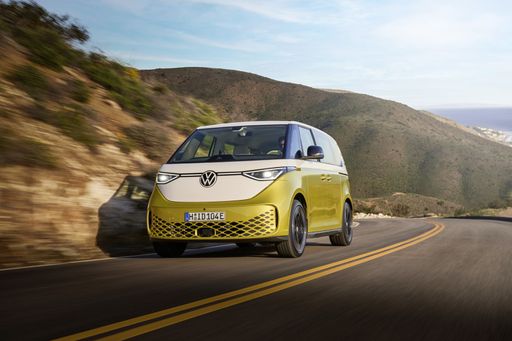 @ Volkswagen
@ Volkswagen
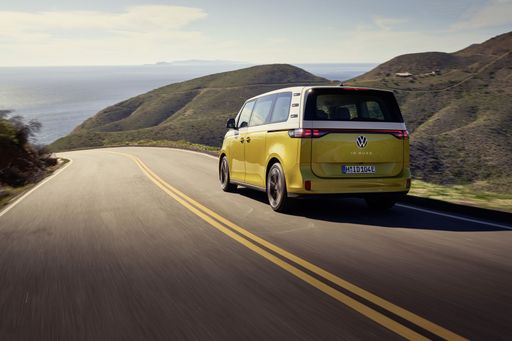 @ Volkswagen
@ Volkswagen
 @ Volkswagen
@ Volkswagen
 @ Volkswagen
@ Volkswagen
 @ Volkswagen
@ Volkswagen
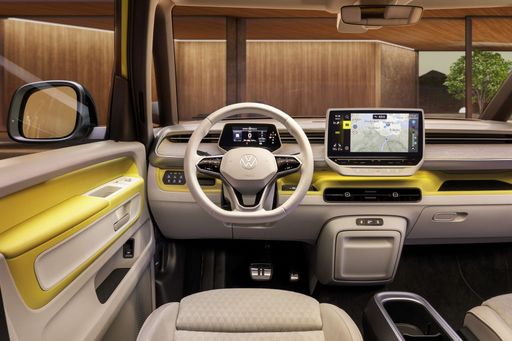 @ Volkswagen
@ Volkswagen
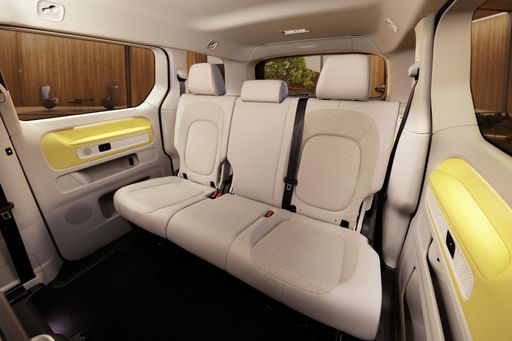 @ Volkswagen
@ Volkswagen
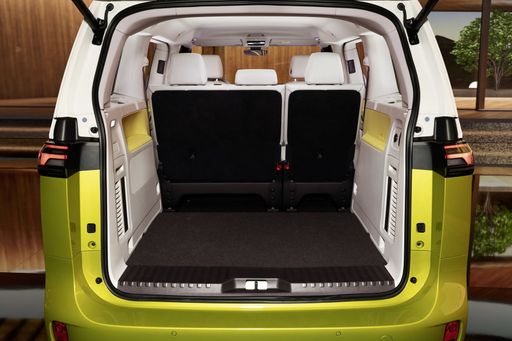 @ Volkswagen
@ Volkswagen
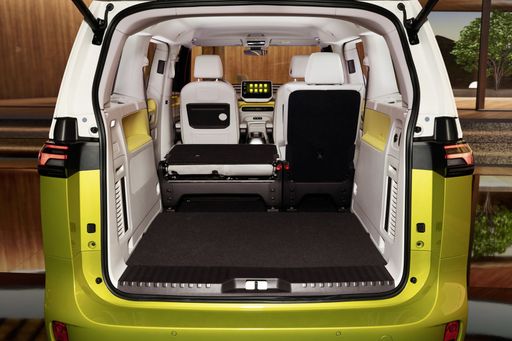 @ Volkswagen
@ Volkswagen

|
|
|
|
|
Costs and Consumption |
|
|---|---|
|
Price
22400 - 34700 £
|
Price
42900 - 64200 £
|
|
Consumption L/100km
5.2 - 6.3 L
|
Consumption L/100km
-
|
|
Consumption kWh/100km
17.40 kWh
|
Consumption kWh/100km
19 - 20.6 kWh
|
|
Electric Range
354 km
|
Electric Range
329 - 485 km
|
|
Battery Capacity
-
|
Battery Capacity
59 - 86 kWh
|
|
co2
0 - 143 g/km
|
co2
0 g/km
|
|
Fuel tank capacity
53 - 61 L
|
Fuel tank capacity
-
|
Dimensions and Body |
|
|---|---|
|
Body Type
Cargo Van
|
Body Type
Bus
|
|
Seats
2 - 6
|
Seats
5
|
|
Doors
4 - 5
|
Doors
5
|
|
Curb weight
1329 - 1813 kg
|
Curb weight
2400 - 2780 kg
|
|
Trunk capacity
-
|
Trunk capacity
1121 - 1340 L
|
|
Length
4401 - 4751 mm
|
Length
4712 - 4962 mm
|
|
Width
1848 mm
|
Width
1985 mm
|
|
Height
1820 - 1825 mm
|
Height
1924 - 1927 mm
|
|
Max trunk capacity
3300 - 3900 L
|
Max trunk capacity
2205 L
|
|
Payload
611 - 991 kg
|
Payload
462 - 600 kg
|
Engine and Performance |
|
|---|---|
|
Engine Type
Diesel, Petrol, Electric
|
Engine Type
Electric
|
|
Transmission
Manuel, Automatic
|
Transmission
Automatic
|
|
Transmission Detail
Manual Gearbox, Automatic Gearbox, Reduction Gearbox
|
Transmission Detail
-
|
|
Drive Type
Front-Wheel Drive
|
Drive Type
Rear-Wheel Drive, All-Wheel Drive
|
|
Power HP
102 - 136 HP
|
Power HP
170 - 340 HP
|
|
Acceleration 0-100km/h
11.20 s
|
Acceleration 0-100km/h
6.1 - 10.7 s
|
|
Max Speed
135 - 183 km/h
|
Max Speed
145 - 160 km/h
|
|
Torque
205 - 300 Nm
|
Torque
310 - 679 Nm
|
|
Number of Cylinders
3 - 4
|
Number of Cylinders
-
|
|
Power kW
75 - 100 kW
|
Power kW
125 - 250 kW
|
|
Engine capacity
1199 - 1499 cm3
|
Engine capacity
-
|
General |
|
|---|---|
|
Model Year
2024
|
Model Year
2024
|
|
CO2 Efficiency Class
E, A
|
CO2 Efficiency Class
A
|
|
Brand
Vauxhall
|
Brand
VW
|
What drivetrain options does the Vauxhall Combo Cargo have?
The Vauxhall Combo Cargo is offered with Front-Wheel Drive.
The prices and data displayed are estimates based on German list prices and may vary by country. This information is not legally binding.
